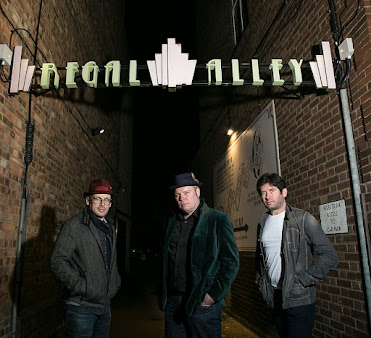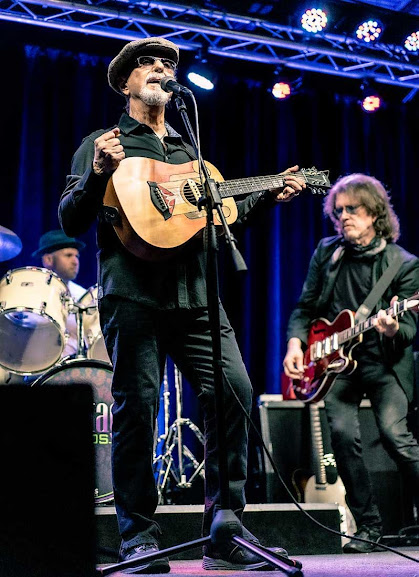Here's a chance to catch up with a clutch of recent releases in the EP and single domain.
Jimmy Regal And The Royals – Ain’t Done Yet
As Bertie Wooster might have put it, they interest me strangely, do Jimmy Regal And The Royals. On one level there’s a sensibility to them that’s as British as roast beef and Yorkshire pudding. But as the five tracks on their Ain’t Done Yet EP demonstrate, their musical palette extends to more exotic influences.
This openness is most apparent on the tracks that bookend the EP, ‘Ain’t Done Yet’ itself and a radio edit of ‘Can’t Cry No More’, which appeared previously on their album Late Night Chicken.
 |
| Jimmy Regal And The Royals - which one's Jimmy? |
In between these two poles, ‘Mickey Two Suits’ – a title deserving of an award all on its won – is a blast of instrumental boogie on which Watkins’ harp lends an infusion of urgency to Williams’ chunka-chunka guitar. ‘Way To Lose’ is a more downbeat affair, combining ripples of acoustic guitar, moans of nocturnal harmonica and minimalist, atmospheric persussion as the basis for Watkins’ groaned vocal. And ‘Show Time’ is an intriguing affair, with Samuels’ patter-and-lurch rhythm matched to fuzzy splutters and splinters of guitar that occasionally get spiky in tandem with Watkins’ bursts of harp. Meanwhile Watkins vocal may hint at a Brilleaux-esque growl, but this ain’t no Feelgood-like rock’n’roll, it’s a more idiosyncratic example of British blues.
All in all, Ain’t Done Yet confirms the impression that Jimmy Regal And The Royals may not be a big name in the making, but they are an outfit with something original to offer.
Ain’t Done Yet is out now, and available from Lunaria Records here.
Elles Bailey – ‘Stones’
The third single from Elles Bailey’s forthcoming album Shining In The Half Light rides in on a brooding slide riff from Joe Wilkins, grinding along in Resonator-like fashion over subtle, reined-in drums. Then Bailey’s moody, assertive vocal swings into play, and Wilkins’ slide playing finds slithering groans and moans to harmonise with her on particular segments, while elsewhere some elegant vocal harmonies bring additional richness to Bailey’s delivery. Wilkins then earns
 |
| Elles Bailey wonders where her hat has gone Pic by Rob Blackham |
extra bonus points with a slithering slide solo. All in all ‘Stones’ makes a far more impressive impact than Bailey’s summer release ‘Cheats & Liars’.
Shining In The Half Light will be released by Outlaw Music on 25 February, and can be pre-ordered here.
Wily Bo Walker Acoustic Band – ‘Long Way To Heaven (Live)’
With which Wily Bo Walker, as is his wont, reworks a song from his back catalogue in a different style, this time taking a 90% acoustic approach to a song previously titled ‘The Ballad of Johnny And Louise’ when it appeared on the album The Roads We Ride recorded with compadre ED Brayshaw. But while the instrumentation here may be different, there’s still a familiar cinematic tone to ‘Long Way To Heaven’, as a tale of the two characters out on the road in the American night. Lyle Zimmerman adds twinkling mandolin to Walker’s familiar, Waits-like groan of a voice, while Gary Bridgewood contributes sweeps of elegiac fiddle. Brayshaw meanwhile (whose latest solo album is reviewed here), is responsible for the non-acoustic dimension, adding harmonic electric guitar notes for colour, and a brief but typically edgy solo.
‘Long Way To Heaven (Live)’ is available now on Mescal Canyon Records.
John Mayall – ‘Can’t Take No More’
It’s remarkable to think that John Mayall is now 88-years old – the likes of Jagger and Richards are mere striplings by comparison – yet here he is gearing up to the release of his gazillionth album in the New Year, from which ‘Can’t Take No More’ is the second single. And a sprightly affair it is too, even if Mayall’s vocal is, in all honesty, stronger on phrasing than melody. Horns riff brightly, and Mayall’s organ tootles over a tripping, shuffling rhythm from Jay Davenport and funky bass from Greg Rzab. Special guest Marcus King brings the guitar quotient, with an extended but relaxed solo, to which Mayall adds subtle remarks on organ, and there’s a spikier King outro to round things off. ‘Can’t Take No More’ isn’t a humdinger of a track, but delivering something like this is still as easy as falling off a log for John Mayall.
John Mayall’s new album The Sun Is Shining Down is released by 40 Below Records on 28 January.




